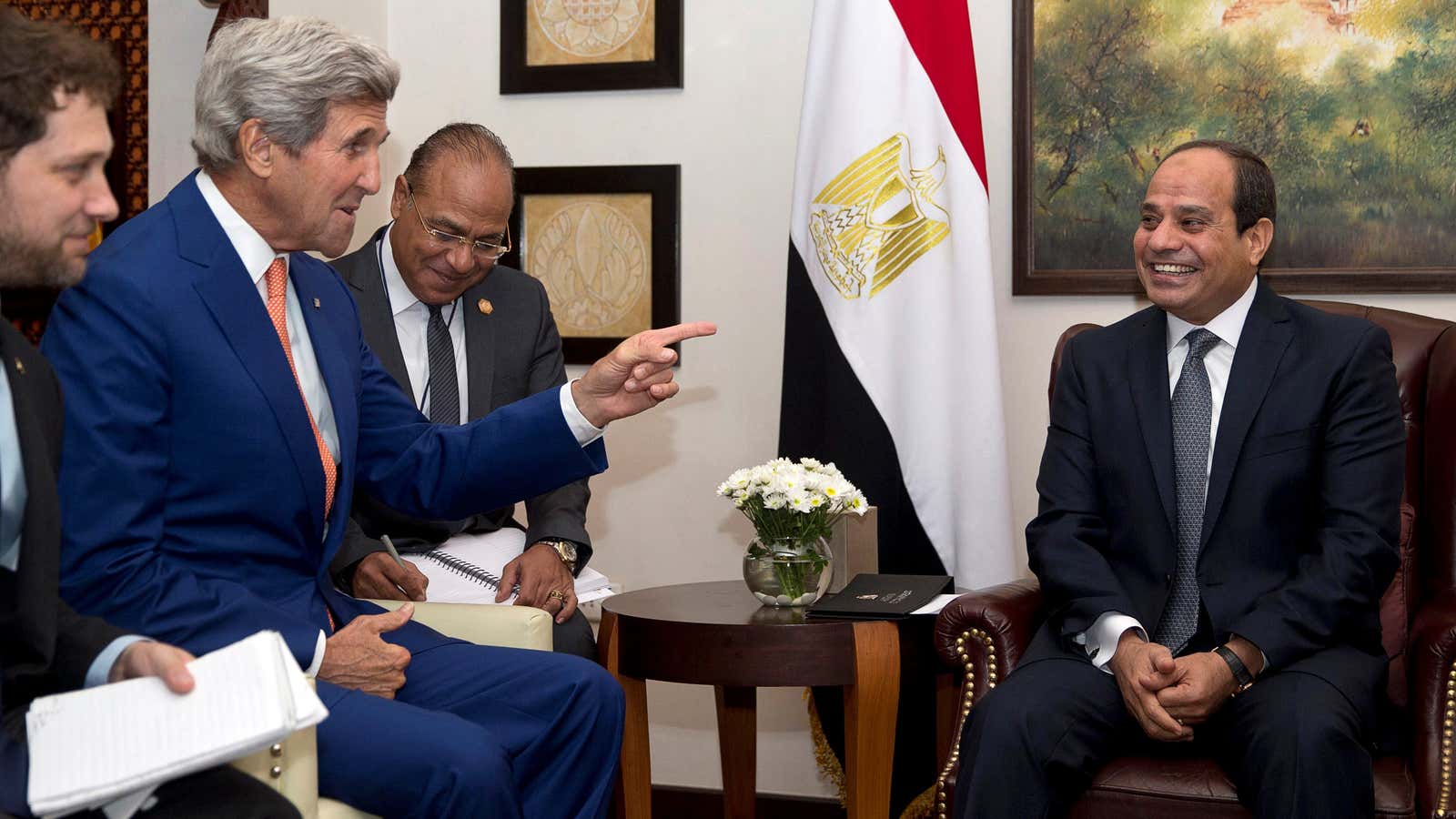The top US climate diplomat John Kerry visited Egypt, Saudi Arabia, and the United Arab Emirates this week, in a tour aimed at drumming up support for climate action ahead of COP26, the global summit in Glasgow in November.
In an interview with Quartz on his way out of Cairo, Kerry lauded Egypt’s work on building out solar and wind farms. But he also cautioned president Abdel Fattah Al-Sisi’s government against investing too heavily in oil and gas production, which today is a cornerstone of the country’s economic development strategy. It’s important for Egypt to proceed with caution on fossil fuels, Kerry said, especially if the country wants to lead by example on climate change as the likely host of next year’s COP27.
Egypt’s climate economy
Since taking office in 2014, in controversial and tumultuous circumstances, Sisi has pushed to modernize the Egyptian economy.
A top priority has been to expand access to reliable energy for the cars, factories, and air conditioners of its rapidly growing population of more than 100 million, by far the largest in the Middle East and North Africa. His administration has sought to tap the country’s abundant natural resources, including the sun and wind, and is building what it claims will be the world’s largest solar farm. The government has said it hopes to get one-fifth of the country’s electricity from renewables by 2022.
But Egypt is also scrambling to attract foreign investment in oil and gas production, and has inked fossil fuel deals worth $74 billion since 2014, including with US companies like ExxonMobil and Chevron. Oil and gas, officials believe, could not only be a vital source of domestic energy—the German conglomerate Siemens recently completed a series of enormous gas-fired power plants there—but also a valuable export commodity. In 2019, thanks largely to the 2015 discovery of large offshore gas deposits, Egypt became a net energy exporter, and the country is now jockeying for position in the global race to supply liquified natural gas to Europe.
In the absence of large-scale carbon capture technology, Kerry told Quartz, that development strategy “presents a very real long-term challenge to raising our ambition on the climate crisis.”
John Kerry’s issues with Egypt
“It’s fair to say we would have some concerns about large-scale oil and gas deployment at this point in time because we know there are alternatives,” Kerry said. “We would advocate caution about how long and how big that deployment might be. That’s not to say that for a period of time gas couldn’t be part of the transition effort. But the faster we can move to a broader base of renewable power production, the better it will be for our efforts to live up to the Paris agreement.”
Kerry said that president Biden is also closely monitoring the escalation of hostilities between Egypt and Ethiopia over the latter’s construction of a massive new dam on the Nile, which Egypt sees as an existential threat to its water security and electricity production from its own hydropower dams. That conflict puts even more pressure on Sisi to develop alternative energy sources—carbon-free or not—said Paul Sullivan, an energy lecturer at Johns Hopkins University in Washington who was formerly a faculty member of the American University in Cairo.
In a country that is highly vulnerable to drought, extreme heat, and sea level rise, many Egyptians, from rural farms to the presidential palace, “are apoplectic about what will happen if climate change kicks in too quickly,” Sullivan said. “But the population is growing and they’re trying to industrialize. You can’t capture that with solar. If Egypt leaves its oil and gas in the ground, that could severely impact its economic stability. I do not envy the massive, complicated, and emotional tradeoffs they have to deal with.”
The US and climate finance
While Kerry urges countries like Egypt to step up their climate goals, many analysts say the US is not doing enough to lead by example. The US is billions of dollars behind what it owes developing countries to help them adapt to climate impacts and transition to clean energy. At the G7 meeting last week, the US did not announce any new climate finance, and its commitment for the remainder of Biden’s first term in office—about $5.7 billion per year—is less than smaller economies like Germany and France.
That number should go up, Kerry promised, and he said his office is working with banks and companies to raise more money from the private sector. But he didn’t offer any more specific details.
“We will provide additional funding for the $100 billion fund,” he said, referring to a 2020 goal that rich countries set a decade ago, and missed by at least 25%. “We’re working on the amount, pace, and modality of doing that.”
